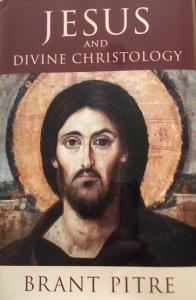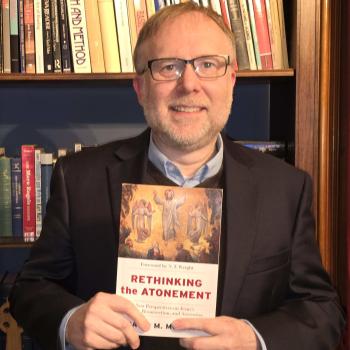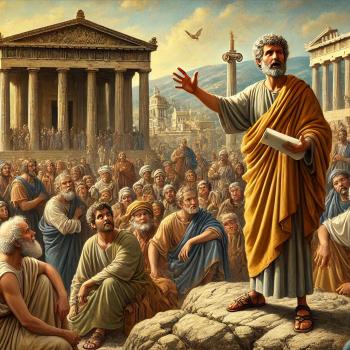We are here this week with my special guest, Brant Pitre, to discuss his recent book, Jesus and Divine Christology (Grand Rapids: Eerdmans, 2024). Dr. Pitre is Distinguished Research Professor of Scripture at the Augustine Institute Graduate School of Theology. He has written a number of publications including Jesus and the Last Supper (Eerdmans), Jesus and the Jewish Roots of Mary (Image), the audio book, The Case for Jesus: The Biblical and Historical Evidence for Jesus (Random House), and with Michael P. Barber and John A. Kincaid, he wrote, Paul, a New Covenant Jew (Eerdmans).
I was first introduced to Brant through Scot McKnight, who wanted Dr. Pitre to write on the Roman Catholic perspective of Paul in my book with Scot entitled, Perspectives on Paul: Five Views (Baker Academic). Brant, it’s a pleasure to be in conversation with you once again! Here are my questions regarding Jesus and Divine Christology:

The Interview
B. J. Oropeza
What are you primarily wanting to accomplish in this new book, Jesus and Divine Christology?
Brant Pitre
My primary goal was to offer a robust study of one very important question: Did the historical Jesus speak or act as if he was a divine messiah? Put somewhat more simply, did Jesus claim to be God? One reason I thought this question important is because of a paradox I encountered in contemporary New Testament studies.
On the one hand, when it comes to the field of historical Jesus research, the vast majority of modern scholars agree that Jesus did not think, speak, or act as if he was in any way “divine.” That is, he did not speak in a way that was more than merely human. I think here of Bart Ehrman’s claim that the “one thing” scholars “all agree” on is that “Jesus did not spend his ministry declaring himself to be divine” (Bart D. Ehrman, How Jesus Became God, HarperOne, 2014: p 88, cf. 44).
On the other hand, if we turn to recent research on early Christology, we discover a growing number of scholars, such as Paula Fredriksen, Larry Hurtado, and Richard Bauckham, agreeing that the earliest Jewish believers in Jesus held a “high” Christology. This view regarded Jesus as divine. Perhaps surprisingly, Ehrman himself agrees that “The idea that Jesus is God… was the view of the very earliest Christians soon after Jesus’ death” (Ehrman, How Jesus Became God, p. 3).
Oropeza
Yes, this is the scholarly paradox we find ourselves in these days.
Pitre
This state of affairs raises an important historical question—If Jesus himself never claimed to be divine, then how do we explain the origins of early divine Christology? How did Jesus go from being a merely human prophet or teacher to being believed to be equal with the One God of Israel?
Most of the explanations on offer—for example, that the resurrection alone explains the deification of Jesus by his followers—do not stand up under scrutiny.
For this reason, I wanted to explore the hypothesis that the reason why the earliest Jewish believers in Jesus thought him divine shortly after his death is because Jesus himself made divine claims during his lifetime. Such claims would not be unlike other royal historical figures such as Alexander the Great, Antiochus IV Epiphanes, Herod Antipas, and Gaius Caligula.
In Jesus and Divine Christology, I argue that Jesus claimed to be divine, but that he did so in a very Jewish way—using parables, questions, and allusions to Jewish scriptures to both reveal and conceal the apocalyptic secret of his divinity.
In doing so I was trying to fill a gaping lacuna in historical Jesus research. For two hundred years it has been hindered by an almost reflexive reluctance to even explore that possibility that Jesus claimed to be God. This widespread assumption needed to be evaluated for its strengths and weaknesses.
Oropeza
Very good! So how do you think your work contributes to the ongoing discussions of the quest for the historical Jesus? Are we still in the “Third Quest,”* or are we now embarking on a fourth one as some might suggest?
Pitre
Great question. When it comes to the history of the modern quest for Jesus, I agree with Dale Allison and others who have serious reservations about dividing it into tidy stages like the “First Quest,” “Second Quest,” etc. Though such categories can be helpful for introducing students to the field, they tend to dramatically oversimplify matters.
At the same, I do think that we are currently witnessing a methodological paradigm shift away from the form-critical “criteria of authenticity” (multiple attestation, embarrassment, dissimilarity) sometimes associated with the “Third Quest.” Due to the devastating critiques by scholars such as Chris Keith, Anthony Le Donne, and Dale Allison, many scholars (myself included) are no longer convinced the form-critical criteria are reliable indexes of historicity. The question now is—How do we move forward?
Oropeza
Right. I have read about what Keith and others have to say about the standard criteria. Although the criteria of dissimilarity is highly problematic in my opinion, I’m not convinced that some of the other criteria are all that bad. If we are to abandon this approach, then something better needs to replace it, and it should be something that a good portion of scholars can agree on. Otherwise, we will just be talking past one another.
Pitre
To that end, one of the distinctive contributions I tried to make in Jesus and Divine Christology was to retrieve the value of E. P. Sanders triple-context approach, as formulated in his classic work, Jesus and Judaism (1985).
According to a triple-context approach, if a saying or action attributed to Jesus is:
(1) contextually plausible within first-century Judaism,
(2) coherent with other evidence about Jesus, and
(3) and has the power to explain early Christian practice and belief, then it is reasonable to conclude that it is substantially historical.
Conversely, if it is contextually implausible, incoherent, and has no clear aftermath in the early Church, it is reasonable to doubt its historicity.
Unlike many studies of the historical Jesus, I take pains to survey the arguments both for and against historicity, and evaluate their respective strengths and weaknesses. This is one feature of which I’m most proud.
Oropeza
Smart move.
Pitre
Too many books on the historical Jesus simply assert that this or that evidence is historical (or unhistorical), without seriously weighing counter-arguments. To be sure, looking at both sides takes time (and space), but I hope that my work can be a model for future studies in which more attention will be given to the reasons scholar draw conclusions about historicity, whatever methodology is employed.
Oropeza
Among your chapters, what would you consider to be the strongest argument(s) in favor of Christ’s deity in Matthew, Mark, and Luke? In other words, if I were skeptical about Jesus as God in the Synoptic Gospels, which argument(s) would you take me to first?
Pitre
That’s a tough question. On an exegetical level, I would say that my chapter on the Epiphany Miracles (Chapter 2) is perhaps the strongest argument for the depiction of Jesus as divine in the Synoptics. In that chapter, I set out to demolish the modern myth—which goes back at least as far as Ernest Renan—that Jesus is only depicted as divine in the Gospel John.
As I try to show, when the accounts of Jesus stilling the storm (Matt 8:23-27; Mark 4:35-41; Luke 8:22-25) walking on the sea (Matt 14:22-27; Mark 6:45-52; cf. John 6:16-21), and the transfiguration (Matt 17:1-9; Mark 9:2-9; Luke 9:28-36) are interpreted in an early Jewish context, Jesus is clearly being depicted as divine.
In the case of the walking on the sea, he does something Jewish Scripture says “God alone” can do (Job 9:8-10) and takes divine name (“I Am”) as his own (cf. Exod 3:18; Isa 43:1, 10).
Of course, precisely because these are epiphany miracles, some readers have philosophical commitments that prohibit them from even entertaining the possibility that Jesus could have performed the “startling deeds” even Josephus attributes to him (Antiquities 18.63). But I think the chapter makes a compelling case that Jesus is depicted as divine in all four first-century Gospels, not just one.
Oropeza
And on a historical level, what would you say is the strongest case?
Pitre
On the historical front, I would say that my final chapter on Jesus being crucified for blasphemy (Chapter 6) is probably the strongest. As I also show, all four first-century Gospels agree that during his public ministry, Jesus was repeatedly accused of “blasphemy” (see Matt 9:3; 26:65-66; Mark 2:7; 14:63-64; Luke 5:21; John 10:33; 19:7).
This data raises a crucial question: If Jesus never claims to be divine, then why is he accused of blasphemy in the context of questions about his identity? After all, in an early Jewish context, it was not blasphemy to simply claim to be the royal or priestly messiah. On the other hand, it was blasphemy to claim to be more than human. For example, the Seleucid king Antiochus IV Epiphanes was called a “blasphemer” precisely because he claimed to be “equal with God” (2 Maccabees 9:8, 12).
So, the question is this: Why was Jesus crucified? Contrary to popular opinion, most of the hypotheses on offer—for example, that Jesus was crucified because of overturning the money changers in the Temple incident—do not have positive evidence to support them. As Anthony E. Harvey rightly pointed out over forty years ago: “The one charge which is explicitly laid against Jesus in both the synoptics and in John’s gospel [is] that of blasphemy” (Harvey, Jesus and the Constraints of History, Westminster, 1982: p. 170).
Even the idea that Jesus was crucified because he was a messianic pretender only explains the Roman charge against him (think here of the titulus: “King of the Jews”). It does not explain why the Jerusalem Sanhedrin charges him with the capital crime of “blasphemy” (cf. Matt 26:65-66; Mark 14:63-64; cf. John 19:7). This charge can only be adequately explained if Jesus is claiming to be a heavenly or divine messiah, which I contend is precisely what he does when he implicitly describes himself as “coming on the clouds of heaven” and being “seated at the right hand” of God (cf. Psalm 110:1-4; Dan 7:13-14).
Oropeza
The charge of blasphemy indeed seems to be a formidable case.
Pitre
To be sure, many scholars dismiss the evidence of the hearing before the Sanhedrin as unhistorical—but I try to show that the accounts are in fact contextually plausible within early Judaism, coherent with other evidence about Jesus, and provide a powerful explanation for why early Jewish believers such as Stephen, Paul, and James of Jerusalem would eventually be stoned to death for making claims about Jesus that were likewise viewed as blasphemous (Acts 7:55-58; 2 Cor 11:25; Josephus, Ant. 20.200; cf. Lev 24:16).
Indeed, I think the chapter on blasphemy is not only the strongest part of the book. It may also be the most important, since it offers an answer to the perennially important question: Why did Jesus die?
Oropeza
Let’s continue our conversation on John’s Gospel next week.
Notes
* Over the past couple hundred years or so, there is said to be a total of three quests for the historical Jesus. See further, Mark Allan Powell, Jesus as a Figure in History: How Modern Historians View the Man of Galilee, 2nd ed. (Westminster/John Knox Press).

















